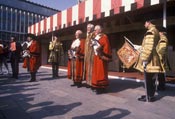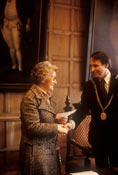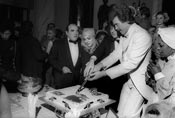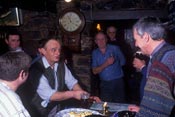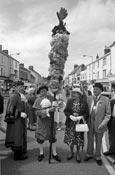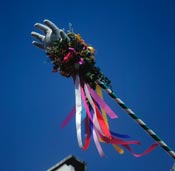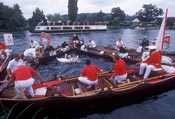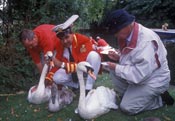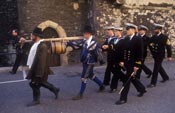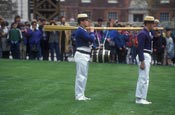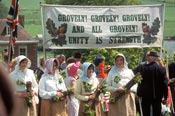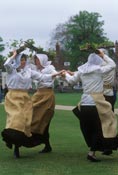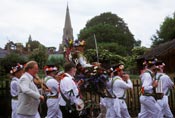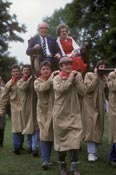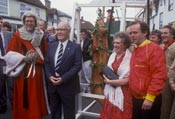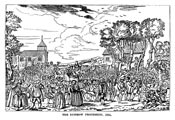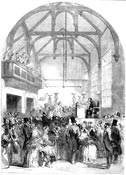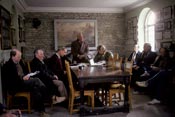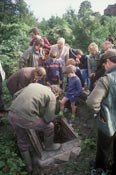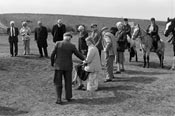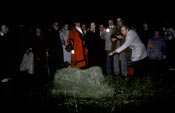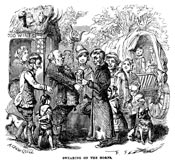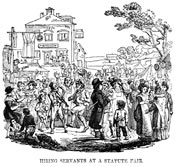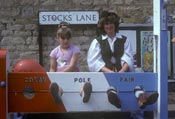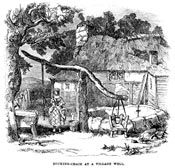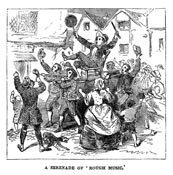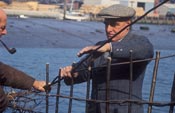
All these customs are legal, but some are more legal than others. The Lord Mayor of London is elected by the Liverymen of the City of London inside the Guildhall each year at Michaelmas, after which he is presented to the people outside by the two Sheriffs (who will themselves be Lord Mayor one day), to much trumpeting by the City Heralds. In Guildford a maid gets her money and at the Theatre Royal, Drury Land the cast get cake on Twelfth Night, according to eccentric, but legally binding, bequests. A few auctions ‘by inch of candle’ are still held, usually for grazing rights to a piece of land. ‘The Glove is up’ still in a few West Country towns to indicate that the fair is in progress. Swan Upping is to mark young swans on the Thames, to divide them between the Queen and the Dyers and Vintners Companies of the City of London, who own them all. Now pure ceremonial but once ships visiting the Pool of London had to pay dues to the Constable of the Tower of London. Apparently the rum is real enough. Great Wishford’s Oak Apple Day ceremonies perpetuate rights to gather wood from Grovely Wood. It has been legal to marry at Gretna Green since 1754 – but in recent times it has become legal to marry almost anywhere. Still, there are over 5000 weddings there each year. The Mayor of Ock Street in Abingdon is elected in a proper ballot but he has no civic duties save as ‘squire’ of the Abingdon Traditional Morris Dancers. Every leap year Great Dunmow holds its famous Flitch Trials at which couples (who have been married for at least a year and a day) claim a flitch (whole side) of bacon if they can prove, before a judge, proper legal counsel and a jury of six maidens and six batchelors, that they have never wished themselves unmarried again. The trials go back 600 years, when a flitch was a huge bonus to the impoverished, though it was only intermittantly claimed. They have been held regularly in Great Dunmow since 1972. All comers are welcome, by prior arrangement, but the claimants don’t always win. Sometimes the jury ‘finds for the bacon’. The Ancient Order of Purbeck Marblers and Stonecutters hold a heavy AGM on Shrove Tuesdays, when they discuss real concerns of their trade. Afterwards they kick a football, to perpetuate their right to move stone along the three mile road between Corfe Castle and Owre Quay – which they have not used for the best part of a century. Every year in Bristol the Vicar, Churchwardens and interested citizens are obliged to inspect a pipe carrying water from a well in Knowle to St Mary Redcliffe Church, according to an edict of 1190. New bounds beaters get ‘dunted’ on boundary stones so that they will never forget where the stones (or other marks) are. At dawn on 11 November the Commoners of Knightlow Hundred in Warwickshire pay ‘Wroth Silver’ to the landowner, the Duke of Buccleuch, as they have since 1170. Surprisingly inflation has not entered into this transaction, though the actual currency has changed with the times. The total tithes amount to less than 50p. Swearing on the Horns was always a joke in Highgate pubs on newcomers on their way to London, who were made to agree to do silly things. It more or less died out in the 19th century – but is sometimes ‘revived’ for charity - and to encourage the consumption of more beer. For 700 years until the Second World War Hiring Fairs (or Mop or Statute Fairs) were a legal and useful way for servants and agricultural workers to find employment.
Some punishments. Stocks were used in England up to the mid-nineteenth century, as a punishment for unsocial behaviour or military desertion, crimes that deserved ritual humiliation. Not only were the stocks uncomfortable in the cold, in the heat or in the wet, but everyone took pleasure in throwing detritus, and abuse, at the hapless miscreant. Stocks are revived every twentieth year (next 2022) for the Corby Pole Fair where people queue up to be put in them, have themselves photographed in them, and pay charity money to be released. Ducking stools were sometimes used for identifying witches but more often for submerging female ‘scolds’. The Penny Hedge is planted every Ascension Eve on the foreshore at Whitby. Apparently it started as a penance on three noblemen for killing a hermit monk while hunting a wild boar in 1159
